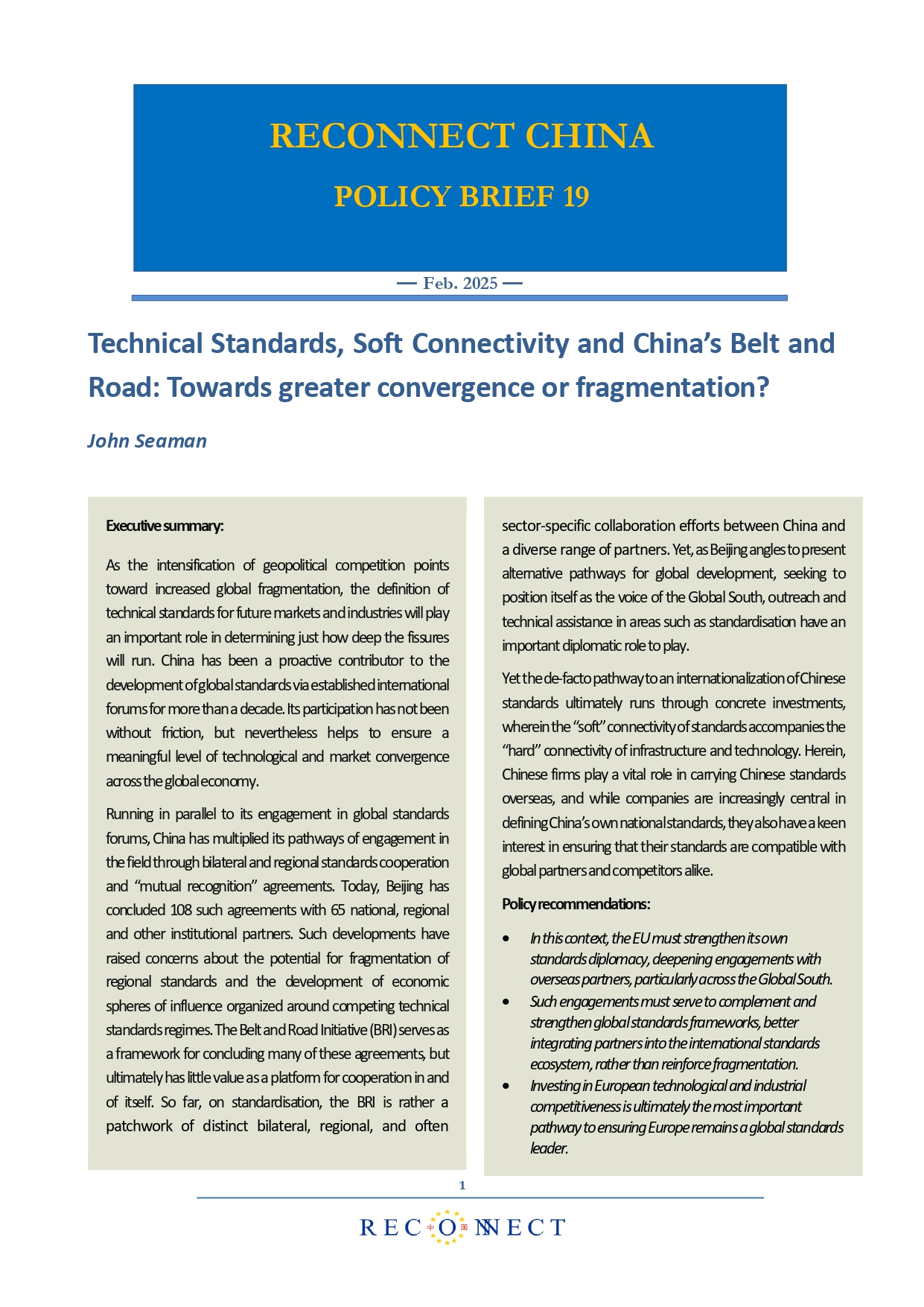Technical Standards, Soft Connectivity and China’s Belt and Road: Towards greater convergence or fragmentation?

As the intensification of geopolitical competition points toward increased global fragmentation, the definition of technical standards for future markets and industries will play an important role in determining just how deep the fissures will run.
China has been a proactive contributor to the development of global standards via established international forums for more than a decade. Its participation has not been without friction, but nevertheless helps to ensure a meaningful level of technological and market convergence across the global economy.
Running in parallel to its engagement in global standards forums, China has multiplied its pathways of engagement in the field through bilateral and regional standards cooperation and “mutual recognition” agreements. Today, Beijing has concluded 108 such agreements with 65 national, regional and other institutional partners. Such developments have raised concerns about the potential for fragmentation of regional standards and the development of economic spheres of influence organized around competing technical standards regimes. The Belt and Road Initiative (BRI) serves as a framework for concluding many of these agreements, but ultimately has little value as a platform for cooperation in and of itself. So far, on standardisation, the BRI is rather a patchwork of distinct bilateral, regional, and often sector-specific collaboration efforts between China and a diverse range of partners. Yet, as Beijing angles to present alternative pathways for global development, seeking to position itself as the voice of the Global South, outreach and technical assistance in areas such as standardisation have an important diplomatic role to play.
Yet the de-facto pathway to an internationalization of Chinese standards ultimately runs through concrete investments, wherein the “soft” connectivity of standards accompanies the “hard” connectivity of infrastructure and technology. Herein, Chinese firms play a vital role in carrying Chinese standards overseas, and while companies are increasingly central in defining China’s own national standards, they also have a keen interest in ensuring that their standards are compatible with global partners and competitors alike.
Download the ReConnect China Policy Brief via the project’s website: Technical Standards, Soft Connectivity and China’s Belt and Road: Towards greater convergence or fragmentation?

Available in:
Themes and regions
Share
Related centers and programs
Discover our other research centers and programsFind out more
Discover all our analyses
China’s Strategy Toward Pacific Island countries: Countering Taiwan and Western Influence
Over the past decade, China has deployed a diplomatic strategy toward the Pacific Island Countries (PICs). This strategy pursues two main objectives: countering Taiwan's diplomatic influence in the region and countering the influence of liberal democracies in what Beijing refers to as the "Global South."

Opening up the G7 to South Korea to Address Contemporary Global Challenges
The G7’s global influence has diminished as powers like China reshape international governance through initiatives such as BRICS and the Shanghai Cooperation Organisation (SCO). With the G7 now representing just 10 per cent of the world’s population and 28 per cent of global GDP, its relevance is increasingly questioned.
Expanding SPDMM as a pivotal institution in the Pacific – A French perspective
The South Pacific Defence Ministers’ Meeting (SPDMM) is the only forum that brings together defense ministers from the wider South Pacific — including Chile, which is hosting it for the first time. This heterogeneous group of countries with varying resources, capacities, and interests — Australia, Chile, Fiji, France, New Zealand, Papua New Guinea (PNG), and Tonga — are united by their shared determination to strengthen cooperation on maritime security and humanitarian assistance and disaster relief (HADR) activities.
EU’s Derisking From China: A Daunting Task
With economic security as a major concern, the EU has recently turned to “derisking” from China. The EU strategy entails reducing critical dependencies and vulnerabilities, including in EU supply chains, and diversifying where necessary, while recognizing the importance and need to maintain open channels of communication.










